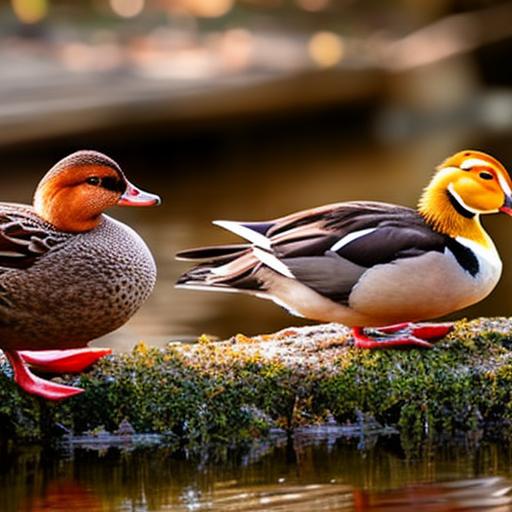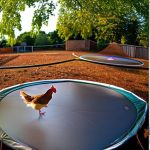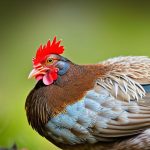Keeping ducks and chickens together is a growing trend among backyard farmers. It offers a range of benefits, including increased pest control, efficient use of space, companionship for the animals, and diverse egg production. While there are some considerations and challenges to keeping these two species together, with proper planning and care, it can be a rewarding and successful endeavor.
Key Takeaways
- Keeping ducks and chickens together is possible and can have benefits.
- Raising ducks and chickens together can lead to increased pest control and fertilizer production.
- Ducks and chickens can be compatible if introduced properly and given enough space.
- Housing for ducks and chickens should provide separate areas for nesting and roosting.
- Ducks and chickens have different dietary needs and should be fed separately.
- Health concerns for ducks and chickens include disease transmission and predator attacks.
- Ducks and chickens have different egg production patterns and sizes.
- Ducks and chickens have different behaviors and social structures.
- Tips for keeping ducks and chickens together include providing ample space and monitoring their interactions.
- Keeping ducks and chickens together may be right for some, but not for everyone.
Benefits of Raising Ducks and Chickens Together
One of the main benefits of raising ducks and chickens together is increased pest control. Ducks are excellent foragers and love to eat insects, slugs, and snails. By allowing them to roam freely in the same area as the chickens, they can help keep the pest population under control. This can be particularly beneficial for those who have gardens or crops that are susceptible to damage from pests.
Another advantage is the more efficient use of space. Ducks and chickens have different foraging habits, with ducks preferring wetter areas and chickens enjoying drier ground. By allowing them to share the same space, you can make use of different areas of your yard or farm that may not be suitable for one species alone. This can help maximize the use of your available land.
Keeping ducks and chickens together also provides companionship for the animals. Ducks and chickens are social creatures and enjoy being part of a flock. By allowing them to interact with each other, you are providing them with companionship and reducing the risk of loneliness or boredom. This can lead to happier and healthier animals overall.
Lastly, raising ducks and chickens together allows for diverse egg production. Ducks lay larger eggs with a richer yolk, while chickens lay smaller eggs with a milder taste. By having both species in your flock, you can enjoy a variety of eggs for cooking and baking. This can add an exciting element to your culinary endeavors.
Compatibility of Ducks and Chickens
While ducks and chickens can be raised together, it is important to consider their similarities and differences in behavior. Ducks are generally more active and enjoy swimming and foraging in water. Chickens, on the other hand, prefer to stay on dry land and scratch the ground for food. It is important to provide both species with suitable areas for their preferred activities.
When introducing ducks and chickens to each other, it is best to do so gradually. Start by keeping them in separate enclosures within sight of each other. This allows them to become familiar with each other’s presence without direct contact. After a few days, you can begin supervised introductions, allowing them to interact while closely monitoring their behavior.
It is important to watch out for signs of aggression during the introduction process. Some chickens may peck at the ducks or try to establish dominance. If this occurs, it may be necessary to separate them temporarily and try again later. It is also important to provide plenty of hiding spots and escape routes for the ducks, as they may need a safe space to retreat to if they feel threatened.
Housing Requirements for Ducks and Chickens
When housing ducks and chickens together, it is important to consider their specific needs. The coop and run should be designed to accommodate both species comfortably. The coop should have enough space for roosting bars for the chickens and nesting boxes for both species.
Ducks require access to water for swimming and cleaning themselves. This can be provided through a small pond or a shallow container that is regularly filled with fresh water. It is important to ensure that the water source is safe and secure, as ducks can easily drown if they do not have a way to exit the water.
Both ducks and chickens require access to food and water at all times. It is important to provide separate feeding stations for each species to prevent competition or aggression over food. Additionally, ducks have different nutritional needs compared to chickens, so it is important to provide a balanced diet for both species.
Feeding Requirements for Ducks and Chickens
Ducks and chickens have different dietary needs, so it is important to provide them with appropriate food. Ducks require a higher protein content in their diet, as well as additional niacin. This can be achieved through a combination of commercial duck feed, fresh greens, and insects. Chickens, on the other hand, require a balanced diet of grains, protein, and calcium.
To ensure that both species receive the necessary nutrients, it is best to provide separate feeding stations. This allows you to control the amount and type of food each species receives. It is also important to provide fresh water at all times, as both ducks and chickens require regular hydration.
Feeding ducks and chickens together can be done with some precautions. It is important to monitor their behavior during feeding time to ensure that there is no aggression or competition over food. If necessary, you can separate them temporarily during feeding to prevent any issues.
Health Concerns for Ducks and Chickens

Like any animals, ducks and chickens are susceptible to diseases and illnesses. It is important to be aware of common health concerns and take preventative measures to keep them healthy.
Some common diseases that can affect ducks and chickens include respiratory infections, parasites, and nutritional deficiencies. Regular health checks and vaccinations can help prevent these issues. Additionally, providing a clean and sanitary environment for the animals can help reduce the risk of disease transmission.
If any health issues arise, it is important to seek veterinary care promptly. Early detection and treatment can often lead to successful outcomes. It is also important to quarantine any sick animals to prevent the spread of illness to the rest of the flock.
Egg Production of Ducks and Chickens
One of the joys of keeping ducks and chickens together is the diverse egg production. Ducks lay larger eggs with a richer yolk, while chickens lay smaller eggs with a milder taste. This can add variety to your egg collection and provide different options for cooking and baking.
To collect and store eggs, it is important to have suitable nesting boxes for both species. Ducks prefer a more open and spacious nesting area, while chickens prefer a smaller and more enclosed space. Providing separate nesting boxes can help ensure that each species has a comfortable and secure place to lay their eggs.
To maximize egg production, it is important to provide a suitable environment for both ducks and chickens. This includes providing proper nutrition, access to fresh water, and a clean and comfortable nesting area. Regularly collecting eggs can also help encourage continued egg laying.
Behavior of Ducks and Chickens
Ducks and chickens have different behaviors, but they can still interact with each other in a harmonious way. Ducks are generally more active and enjoy swimming and foraging in water. Chickens, on the other hand, prefer to scratch the ground for food and roost on perches.
When observing their behavior, it is important to be aware of any signs of aggression or stress. Aggression can manifest as pecking, chasing, or territorial behavior. If any aggression occurs, it may be necessary to separate the animals temporarily or provide additional hiding spots for the ducks.
It is also important to be able to read their body language to understand their needs and emotions. Ducks may wag their tails or bob their heads when they are excited or happy. Chickens may puff up their feathers or make specific vocalizations when they are feeling threatened or asserting dominance.
Tips for Keeping Ducks and Chickens Together
To maintain a harmonious flock of ducks and chickens, there are some best practices to follow. Firstly, it is important to provide enough space for both species to roam and forage comfortably. This can help reduce competition and aggression over resources.
Regular monitoring of their behavior is also crucial. By observing their interactions, you can quickly identify any signs of aggression or stress and take appropriate action. Providing plenty of hiding spots and escape routes for the ducks can also help reduce the risk of aggression.
If any issues arise, it is important to troubleshoot and address them promptly. This may involve separating the animals temporarily, providing additional resources, or seeking professional advice. There are also many resources available online and in books that can provide further information on keeping ducks and chickens together.
Is Keeping Ducks and Chickens Together Right for You?
Keeping ducks and chickens together can be a rewarding and enjoyable experience. It offers a range of benefits, including increased pest control, efficient use of space, companionship for the animals, and diverse egg production. However, it is important to consider the specific needs and behaviors of each species before deciding if it is the right choice for your backyard farm.
By providing suitable housing, feeding, and healthcare, you can create a harmonious flock of ducks and chickens. Regular monitoring of their behavior and addressing any issues promptly can help ensure a successful cohabitation. With proper planning and care, keeping ducks and chickens together can be a fulfilling and rewarding endeavor.
If you’re considering keeping ducks and chickens together, you may find the article “The Chicken Coop Country Diner” on Poultry Wizard’s website quite helpful. This informative piece discusses the benefits and considerations of cohabitating ducks and chickens in the same coop. It provides valuable insights into creating a harmonious environment for both species, ensuring their safety, and maximizing their overall well-being. To learn more about this topic, check out the article here. For additional poultry-related information, visit Poultry Wizard’s homepage at https://poultrywizard.com or explore their fascinating article on the “Hannah Montana Chicken Coop” at https://poultrywizard.com/keeping-chickens/hannah-montana-chicken-coop/.
FAQs
What are the differences between ducks and chickens?
Chickens are ground-dwelling birds that are primarily used for their meat and eggs. Ducks, on the other hand, are waterfowl that are also used for their meat and eggs, but are also kept for their ornamental value and as pets. Ducks have webbed feet and waterproof feathers, while chickens have scaly feet and non-waterproof feathers.
Can ducks and chickens be kept together?
Yes, ducks and chickens can be kept together, but there are some considerations to keep in mind. Ducks require more water than chickens, so they will need access to a pond or pool. Additionally, ducks are messier than chickens and produce more waste, so their living area will need to be cleaned more frequently.
What are the benefits of keeping ducks and chickens together?
Keeping ducks and chickens together can provide a number of benefits. They can help control pests in the garden, such as slugs and snails. Additionally, ducks and chickens can help fertilize the soil with their waste, which can improve the health of plants. Finally, ducks and chickens can provide a source of fresh eggs and meat.
What are the potential problems with keeping ducks and chickens together?
There are some potential problems with keeping ducks and chickens together. Ducks require more water than chickens, so they may make a mess of the water source and create muddy areas. Additionally, ducks can be aggressive towards chickens, especially during mating season. Finally, ducks produce more waste than chickens, which can create an unpleasant odor and attract flies.
What should I consider before keeping ducks and chickens together?
Before keeping ducks and chickens together, you should consider the space you have available, the amount of water the ducks will need, and the potential for aggression between the two species. You should also consider the amount of time and effort you are willing to put into cleaning their living area and maintaining their health. Finally, you should check with your local zoning laws to make sure that keeping ducks and chickens is allowed in your area.
Meet Walter, the feathered-friend fanatic of Florida! Nestled in the sunshine state, Walter struts through life with his feathered companions, clucking his way to happiness. With a coop that’s fancier than a five-star hotel, he’s the Don Juan of the chicken world. When he’s not teaching his hens to do the cha-cha, you’ll find him in a heated debate with his prized rooster, Sir Clucks-a-Lot. Walter’s poultry passion is no yolk; he’s the sunny-side-up guy you never knew you needed in your flock of friends!







